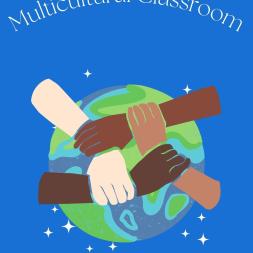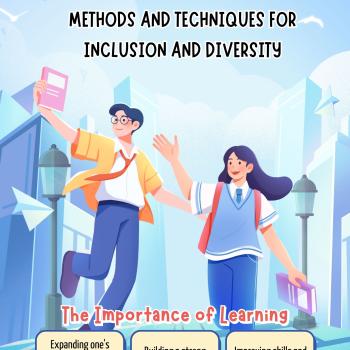
Multicultural Classroom
The “Multicultural Classroom” course is designed to provide teachers with the skills and knowledge needed to create an inclusive and positive learning environment for students from diverse cultural backgrounds.
Description
Day 1: Understanding Cultural Diversity
- Introduction to multicultural education and its importance in today’s classrooms
- Activities to help participants reflect on their own cultural backgrounds and assumptions
- Case studies and group discussions to illustrate the challenges and opportunities of working in a multicultural classroom
Day 2: Building Relationships with Students from Diverse Backgrounds
- Techniques for building positive relationships with students from diverse backgrounds
- Strategies for addressing cultural biases and assumptions
- Role-playing exercises to practice effective communication with students from diverse backgrounds
- Group discussions on best practices for engaging with families and communities from diverse backgrounds
Day 3: Creating an Inclusive Classroom Environment
- Techniques for creating an inclusive and supportive classroom environment
- Strategies for addressing issues related to bias and discrimination in the classroom
- Collaborative activities to develop cross-cultural competence among students
- Case studies and group discussions on how to promote a culture of inclusivity and understanding in the classroom
Day 4: Using Multicultural Education to Enhance Teaching and Learning
- Overview of instructional strategies that support multicultural education, including differentiated instruction and culturally responsive teaching
- Activities to help participants develop lesson plans that incorporate multicultural education principles
- Group discussions on how to evaluate student progress and adjust instruction to meet the needs of all learners
Day 5: Integrating Multicultural Education into Classroom Practice
- Opportunities to practice and refine skills learned throughout the course
- Reflection activities to assess course learning and personal growth in multicultural education
- Planning for integrating multicultural education into future classroom practice
Learning objectives
Upon completion of the “Multicultural Classroom” Erasmus+ KA1 Course, participants will be able to:
- Develop an understanding of the key concepts related to multicultural education, including cultural diversity, intercultural communication, and cultural sensitivity.
- Apply practical strategies and techniques for addressing cultural biases and building relationships with students from diverse backgrounds.
- Create a welcoming and supportive classroom environment that is conducive to the learning and development of all students, regardless of their cultural or linguistic background.
- Use a range of interactive and experiential methodologies to engage with students from diverse backgrounds and to create a culture of inclusivity and understanding in the classroom.
- Reflect on their own cultural backgrounds and biases, and develop a deeper understanding of how these may impact their interactions with students from diverse backgrounds.
Overall, the “Multicultural Classroom” Erasmus+ KA1 Course is designed to help teachers develop the knowledge and skills necessary for creating an inclusive and supportive learning environment that meets the needs of all students, regardless of their cultural or linguistic background. By the end of the course, participants will have a deeper understanding of multicultural education and will be able to apply their learning to real-world classroom scenarios.
Methodology & assessment
1. Lectures and Presentations: The training course will include lectures and presentations on key topics related to multicultural education, including cultural sensitivity, intercultural communication, and cultural diversity. These lectures will be delivered by expert trainers and will provide participants with a theoretical foundation for their learning.
2. Case Studies: Participants will engage in case studies that illustrate real-world examples of how to create a welcoming and supportive classroom environment for students from diverse cultural backgrounds. These case studies will be used to encourage participants to apply their knowledge and skills to real-life scenarios.
3. Group Discussions: The Erasmus+ KA1 Course will include group discussions that allow participants to share their experiences and ideas with one another. These discussions will be facilitated by trainers and will provide participants with an opportunity to learn from one another.
4. Role-playing: Participants will engage in role-playing exercises that help them develop their skills in communicating with students from diverse backgrounds. These exercises will be used to simulate real-world scenarios and to provide participants with a safe and supportive environment in which to practice their skills.
5. Reflective Activities: Participants will engage in reflective activities that help them assess their own biases and cultural assumptions. These activities will be used to encourage participants to develop a deeper understanding of their own cultural backgrounds and to identify potential biases that may affect their interactions with students from diverse backgrounds.
Certification details
- Certificate of Attendance
- Europass Certificate (if requested)
Pricing, packages and other information
-
Price:400Euro
Additional information
-
Language:English
-
Target audience ISCED:Primary education (ISCED 1)Lower secondary education (ISCED 2)Upper secondary education (ISCED 3)
-
Target audience type:Head Teacher / PrincipalNot-for-profit / NGO staffTeacher
-
Learning time:25 hours or more
Past sessions
More courses by this organiser

Non-Formal Learning Methods And Techniques For Inclusion And Diversity

Blueprint for Financial Literacy Success


